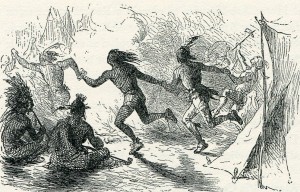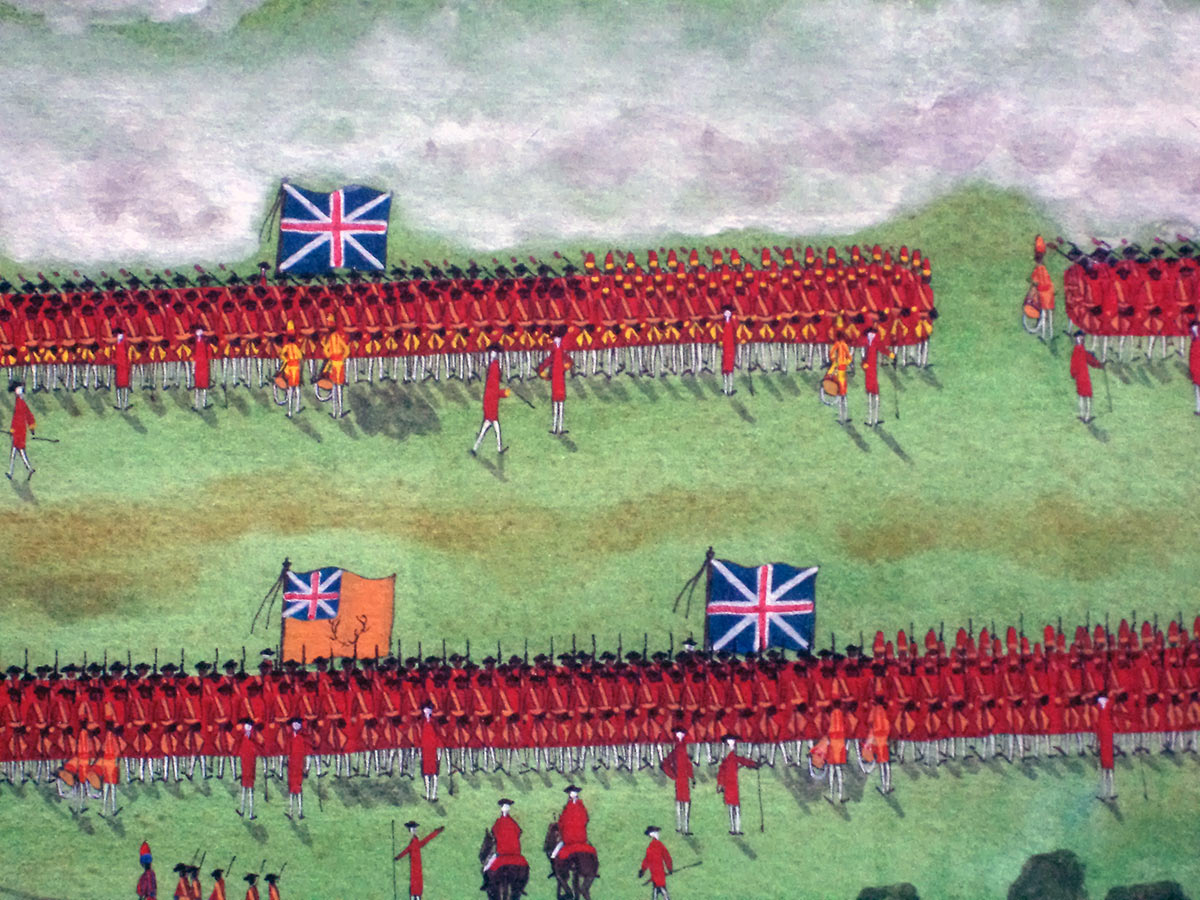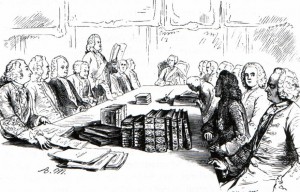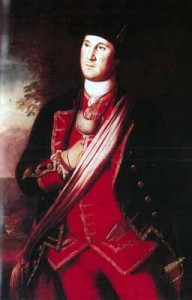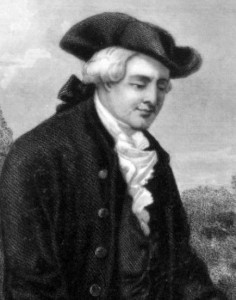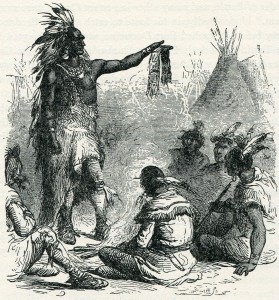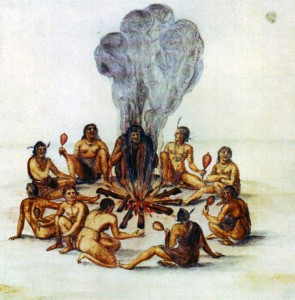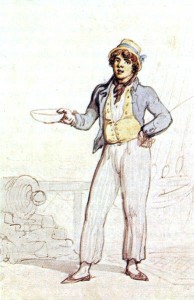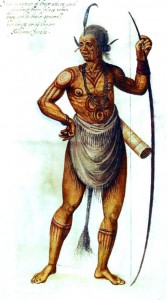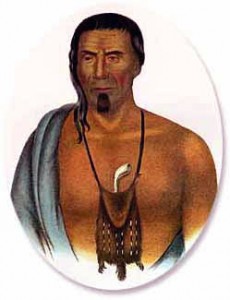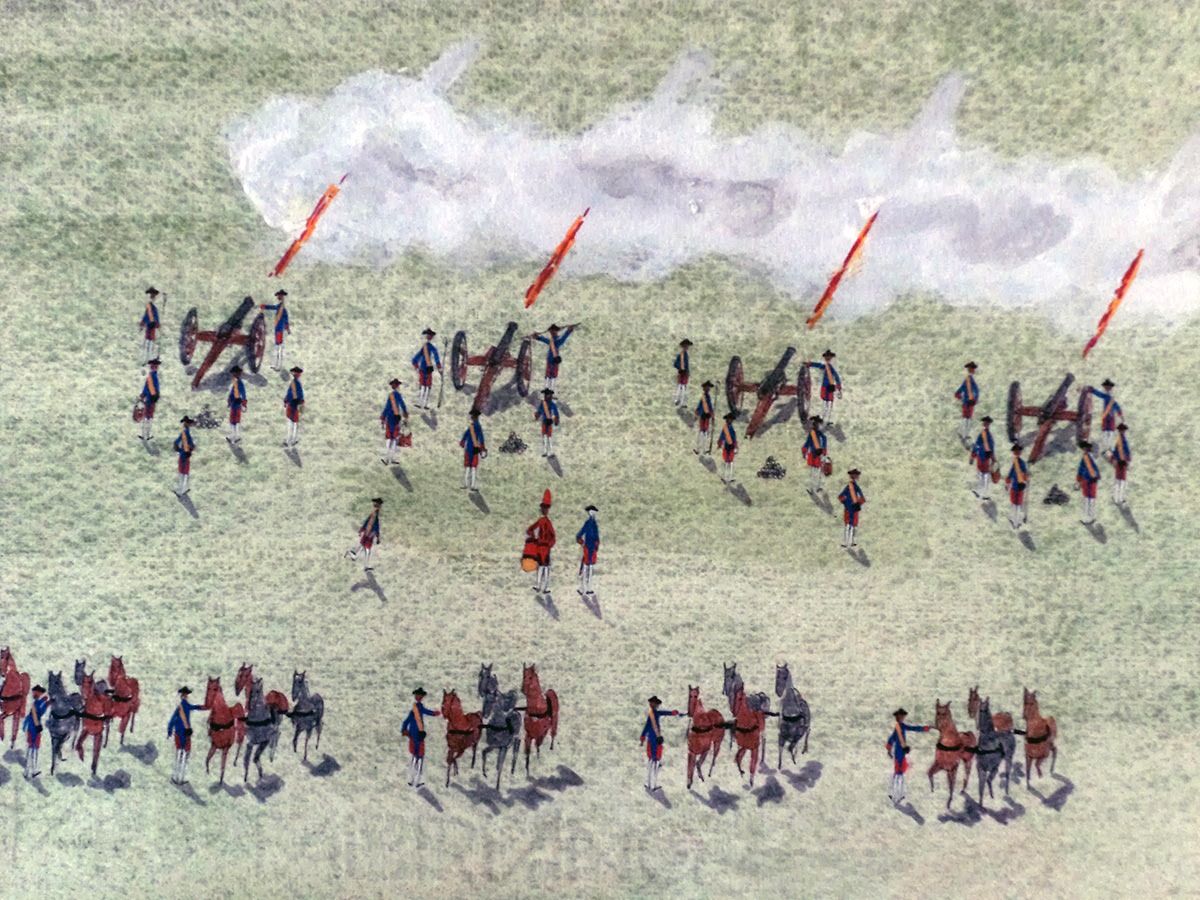The account of General Braddock’s expedition to Fort Duquesne in 1755:
Part 7 Braddock’s army at Fort Cumberland
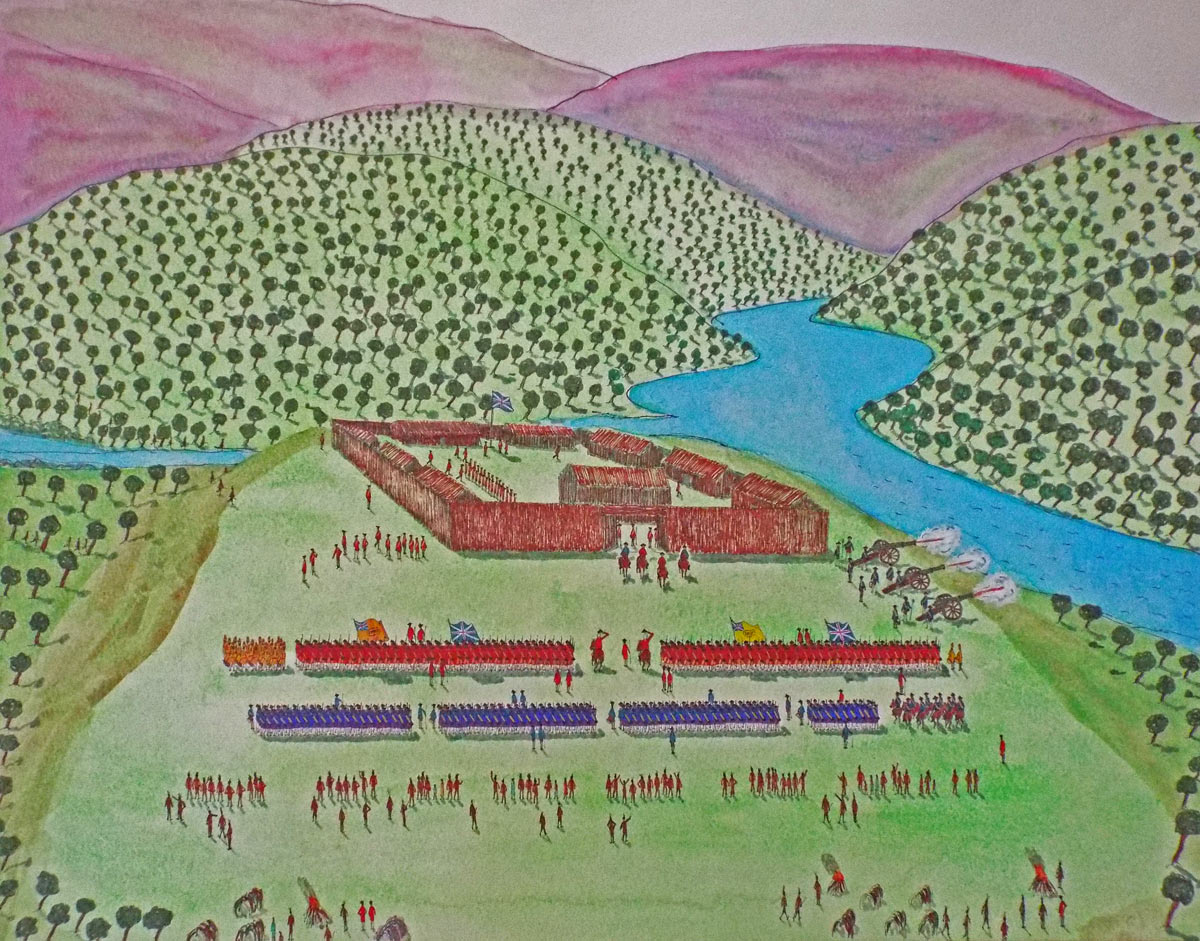
Fort Cumberland May 1755: General Braddock reviews the 44th and 48th Regiments, the Royal Artillery, the Virginia Light Horse and the Virginia Rangers: by John Fawkes: Death of General Edward Braddock on the Monongahela River on 9th July 1755 in the French and Indian War
The previous section on Braddock’s defeat on the Monongahela in 1755 is Part 6: Braddock’s march to Will’s Creek, via Alexandria, Frederick and Winchester in Virginia and Maryland in 1755.
The next section on Braddock’s defeat on the Monongahela in 1755 is Part 8: Braddock’s army’s march from Fort Cumberland to Little Meadows May to June 1755.
To the French and Indian War index
Fort Cumberland:
The Seaman described the fort on his arrival at Will’s Creek on 8th May 1755: “Fort Cumberland is situated within 200 yards of Will’s Creek, on a hill, and about 400 from the Potomack; its length from east to west is about 200 yards, and breadth 46 yards, and is built by logs driven into the ground, and about 12 feet above it, with embrasures for 12 guns, and 10 mounted, 4 pounders, besides stocks for swivels, and loop holes for small arms.”
Sir John Saint Clair, after his visit to Will’s Creek on 26th January 1755, described the fort as simply an area of ground surrounded by a fence. It would seem that at this time there were no buildings incorporated into the fort. Braddock and his army, at least on their arrival at Will’s Creek, lived in tents.
Lowdermilk’s book History of Cumberland Maryland contains a sketch map of Fort Cumberland that Lowdermilk found in the King’s Library of the British Museum, which he states was compiled by an officer on the arrival of Braddock’s army at Fort Cumberland in May 1755. The plan is of the fort fully equipped with accommodation, storehouses, magazine and a hospital, which is not consistent with the descriptions given by Saint Clair and the Seaman.
Charlotte Browne,the matron of the military hospital, described in her journal arriving at Will’s Creek on 13th June 1755: “At 6 we came to Fort Cumberland, the most desolate place I ever saw. Went to Mr Cherrington who received me kindly, drank tea and then went to the Governor’s to apply for quarters. I was put in a hole that I could see day light through every log and a port hole for a window: which was as good a room as any in the fort.”
By the time of Charlotte Browne’s arrival at Will’s Creek it would seem that basic wooden buildings had been erected as part of the fort. It may be that the buildings shown in Lowdermilk’s sketch plan of the fort were built by Braddock’s men in May 1755. In his entry for 21st May 1755 the Seaman records that 100 carpenters were working on a magazine and a bridge over Will’s Creek.
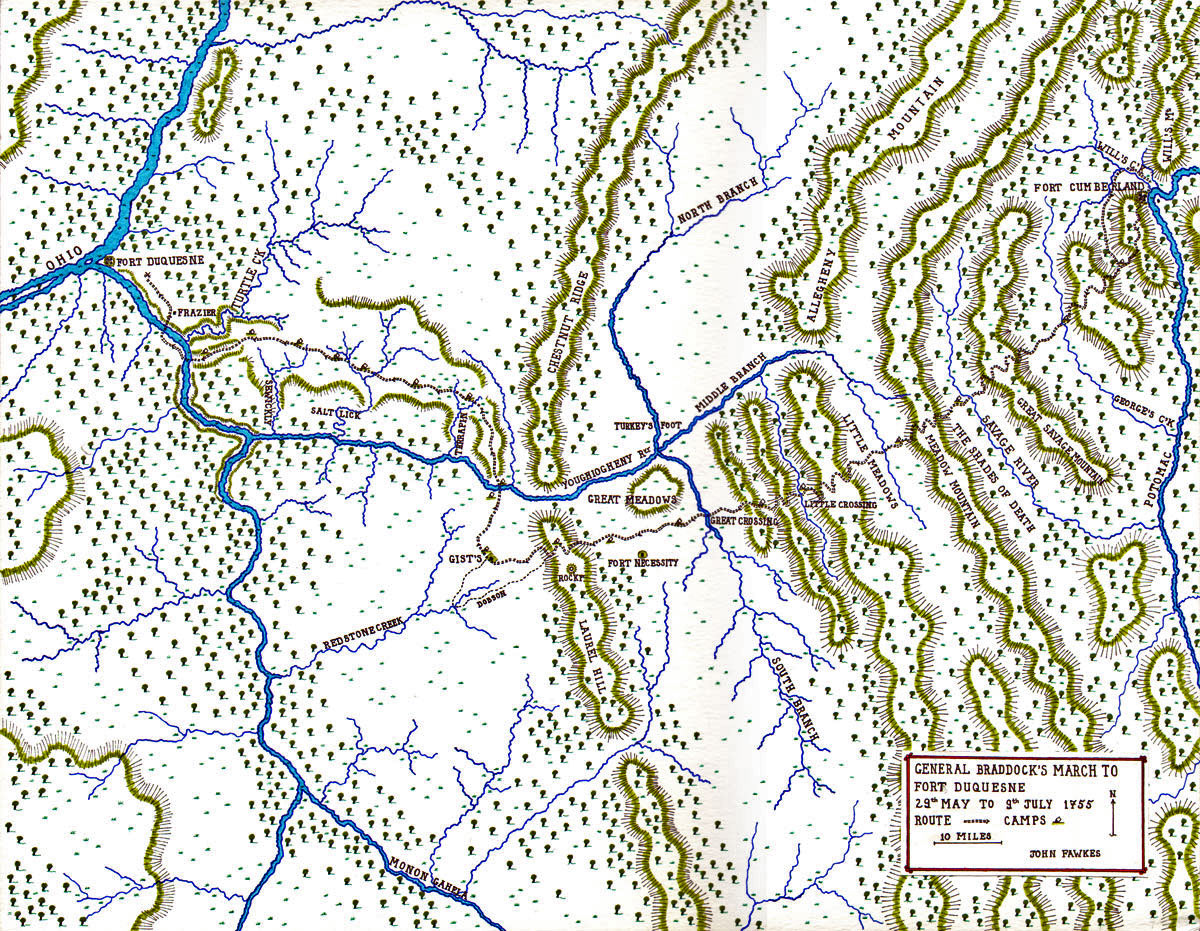
General Braddock’s March to Fort Duquesne 29th May – 9th July 1755 – Map by John Fawkes: Death of General Edward Braddock on the Monongahela River on 9th July 1755 in the French and Indian War
Preparations for the march to the Ohio Forks:
Captain Robert Orme recorded that General Braddock arrived at Fort Cumberland on Saturday 10th May 1755. Already there were 6 companies of the 44th, 2 independent companies and the Virginia Troops encamped at the fort. In addition there were 30 Indians from Pennsylvania.
The Indians were expected to fulfil an important function for Braddock’s army, acting as guides and providing intelligence and reconnaissance on the march to the Ohio Forks.
The Seaman described his impressions of the Indians: “We found here [Will’s Creek] Indian men, women and children to the number of about 100 who were greatly surprised at the regular way of our soldiers marching and the numbers. ….The men are tall, well made and active but not strong, but very dextrous with a rifle barreled gun and their tomahawk which they will throw with great certainty at any mark and at a great distance. They paint themselves in an odd manner red yellow and black intermixed. And the men have the outer rim of their ears cut which only hangs by a bit top and bottom and have tuft of hair left at the top of their heads which is dressed with feathers. Their watch coat is their chief clothing which is a thick blanket thrown all round them and wear moccasins instead of shoes which are deer skin thrown round the ankle and foot. In the day they were in our camp and in the night they go into their own where they dance and make a most horrible noise.”
General Braddock’s orders for Saturday 10th May 1755 stated: “Mr Washington appointed aide de camp to the General. Articles of war to be read tomorrow morning. The 2 Independent companies and rangers to receive 2 days provisions. 48th to relieve the Fort Guard and fort guard to march to Fraziers as a grass guard. Capt Polsons to provide 1 corporal and 6 men with their tools to make such fences as the officer of the grass guard shall think fit.
Virginia and Maryland rangers to settle their men’s accounts immediately. In future to be subsisted twice a week as others. Independent companies, Virginia and Maryland rangers and light horse to send in returns. General has fixed his levy at 10am to 11am every day.”
The Articles of War contained the disciplinary code for the army and was read to the soldiers as a matter of routine to remind them of the consequences of ill-behaviour.
When an army was in camp the horses were put out to grass to save on dried feed. They were inevitably some distant from the main camp, watched over by the ‘Grass Guard’.
Captain Cholmley’s batman and Captain Orme both recorded that General Braddock met the Indians on Sunday 11th May 1755.
The General’s orders for that day stated: “a return to be sent in of men who understand the springing of rocks. All the troops to begin their field days. Powder to be had from the train. Each man to have 12 rounds for every field day. Return to be given of the recruits for the whole army giving their age size and country and occupation. 1 sergeant and 6 men from the piquet to attend during the market to prevent disputes. Rates fixed for market produce. 48th to receive their provisions tomorrow. All the out guards to be relieved tomorrow morning and parade at 5 o’clock. General orders that no officer soldier or other gives the Indian men women or children rum liquor or money.”
This order reflected the requirement for men able to clear rocks from the route of the proposed road to the Ohio Forks, that the soldiers were immediately to begin their field training, that the confusion caused by the influx of so many recruits had still not been sorted out, that Braddock expected to hold markets for local produce as in Europe, and that already there was difficulty with drunkenness among the Indians.
The last contingent of 4 companies of the 44th with the artillery was in the area of Enoch’s, still on its march to Will’s Creek.
On 12th May 1755 Captain Cholmley’s batman recorded that he bought a cow and that they were more than 20 miles beyond the inhabited country. He at least understood the remoteness of Will’s Creek.
In his entry for 12th May 1755 the Seaman described the Congress held with the Indians by General Braddock: “Orders this morning that there will be a congress at the general’s tent at 11am at which time all the officers attended the general and the Indians were brought. The guard received them with their firelocks rested. The interpreter was ordered to tell them that their brothers the English who were their old friends were come to assure them that every misunderstanding that had been in former times should now be buried under that great mountain. Then a string of wampum was given them then a belt of wampum was held forth with the following speech: that this wampum was to assure them of our friendship that everybody who were their enemies were ours; and that it was not the small force only that we had here, but numbers to the Northward under our great War Captains: Shirley, Pepperell, Johnston and others that were going to war and that we would settle them happy in their country and make the French both ashamed and hungry: but that whatever Indians after this declaration did not come in would be deemed by us as our enemies and treated as such. The general then told them he should have presents for them in a few days when he should have another speech to make to them so took their leaves after the ceremony of Drams round.”
The Seaman continued his entry for 12th May 1755: “In the afternoon Mr Spendlowe and self surveyed 20 cases of beef by order of the general and condemned it which we reported to the general. This evening we had a gust of wind with lightning and thunder and rain which drove several tents down and made the camp very uncomfortable.”
General Braddock’s orders for 12th May 1755 stated: “Captain Polson desires a court martial as being accused of being a Jacobite in the rebellion. General Court Martial to sit immediately at the President’s Tent 1 field officer, 6 captains and 6 subalterns. Mr Shirley to be Judge Advocate. Major Sparke president. His Excellency has brigaded the army:
1st Brigade commanded by Sir Peter Halkett:
44th, Rutherford’s, Gates’, Polson’s, Peronnees and Wagner’s and Dagworthy’s Maryland rangers.
2nd Brigade commanded by Colonel Dunbar:
48th, Captain Demerie’s South Carolina Detachment, Captain Dodd’s, Captain Mercer’s carpenters, Stevens’, Hogg’s and Cox’s.
Any soldier or follower of the army who shall stop anyone bringing in provisions or forage to the camp shall immediately suffer death.
Out posts not to march in to beat of drum. No drums before the Troop unless when on exercise when they are to acquaint the general the night before through an adc.”
This order reflects what must have been an acrimonious dispute between Polson and English officers in which Polson was accused of being a Jacobite rebel. No outcome is recorded for the court martial. It may be assumed that it was favourable to Polson. Even if Polson was a rebel, it is hard to see how any evidence could be obtained to that effect in such a remote location.
The order also reflects what appears to have been Braddock’s belief that the reason no supplies were being brought into the market held in the fort was that soldiers were intercepting the country people and taking their provisions from them.
The direction for ‘No drumming before the Troop’ was presumably to prevent the interruption of officers and soldiers sleeping during the night or, possibly, because the soldiers were nervous and jumpy and the sound of drums caused repeated false alarms of attack.
On Tuesday 13th May 1755 Captain Cholmley’s batman recorded a false alarm: “At night piquet advanced in the front of the line. Heard that a body of French Indians within a mile of camp to 500. False.”
The Seaman recorded a visit to the Indians’ camp: “the weather is now extremely hot. This day as the corporal came to exercise our men in the evening I went to see the Indian camp, ¼ mile from ours in the woods. Their houses are 2 stakes driven into the ground with a ridge pole and bark of trees laid up and down the sides, but they generally have a fire in them. This is all the shelter they have from the weather when they are from home. It is a custom with them, once or twice a year for the women to dance and all the men sit by. Each woman takes out her man that she likes dances with him and lies with him for a week and then return to their former husbands and live as they did before.”
On Wednesday 14th May 1755 Captain Cholmley’s batman recorded: “General Court Martial soldiers tried for desertion sentenced to death. 3 tried for stealing barrel of beer in the country 300 lashes with cat of nine tails.”
George Washington drafted a letter to John Carlyle at Alexandria, which was not sent: “Fort Cumberland to Major John Carlyle: I overtook the general at Frederick Town in Maryland and proceeded with him by way of Winchester to this place; which gave him a good opportunity to see the absurdity of the rout and damning it very heartily. Col Dunbar’s regiment was also obliged to cross over at Conocacheague and come down within 6 miles of Winchester to take the new road up, which gave me infinite satisfaction. We are to halt here until forage can be brought from Philadelphia which I suppose will introduce the month of June upon us; and then we are to proceed upon our tremendous undertaking of transporting the heavy artillery over the mountains which I believe will compose the greatest difficulty of the campaign; for as to any apprehensions of the enemy I think they need only to be provided against to be well regarded as I fancy the French will be obliged to draw their force from the Ohio to repel the attacks in the North under the command of Governor Shirley etc who will make three different attempts immediately……. I am in great need of boots and have desired my brother John to purchase a pair and send them to you who I hope will contrive them to me by the first opportunity.”
Washington here expressed the view that the attacks in the north were likely to force the French to withdraw from the Ohio Forks.
George Washington wrote to Mrs George William Fairfax: “I have at last with great pains and difficulty discovered the reason why Mrs Wardrope is a greater favourite of General Braddock than Mrs Fairfax; and met with more respect at the late review in Alexandria. The cause I shall communicate after rallying you for neglecting the means that introduced her to his favour which to say the truth were in a present of delicious cake and potted woodcocks that wrought such wonders upon the heart of the general as upon those of the gentlemen that they became instant admirers, not only the charms but the politeness of this fair lady.”
Washington wrote to his brother, John Washington: “Dear Brother as wearing boots is quite the mode and mine in a declining state I must beg the favour of you to procure me a pair that is good and neat and send them to Major Carlyle who I hope will contrive them as quick as my necessity requires…. I am well convinced that the trouble and difficulty we must encounter in passing the mountain for want of proper conveniences will equal all the other interruptions of the campaign for I conceive the march of such a train of artillery in these roads to be a tremendous undertaking: as to any danger from the enemy I look upon it as trifling, for I believe they will be obliged to exert their utmost force to repel the attacks to the Northward, where Governor Shirley and other’s with a body of 8,000 men will annoy their settlements and attempt their forts. The general has appointed me one of his aides de camps in which character I shall serve this campaign agreeably enough as I am thereby freed from all commands but his and give orders to all which must be implicitly obeyed. I have now a good opportunity and shall not neglect it of forming an acquaintance which may be serviceable hereafter if I can find it worth while pushing my fortune in the military way.”
Washington wrote to Colonel Augustine Washington: “We hear nothing from the Ohio; only that the French are in hourly expectation of being joined by a large body of Indians. But I fancy they will find themselves so warmly attacked in other places that it will not be convenient for them to spare many.”
General Braddock’s orders for 14th May 1755 stated: “General Court Martial dissolved. Luke Woodsward of 48th sentenced to death for desertion pardoned by the general. Thomas Connelly, James Fitzgerald and James Hughes soldiers of the 48th sentenced for theft: 1,000, 800 and 800 lashes at the head of the line. Also to make satisfaction for theft of the barrel of beer to the value of 33s Maryland currency. The General reduces the sentence of Connelly by 100 lashes to receive 900 in 3 times. Others reduced by 200, 600 at two different times. 48th to send the drummers to the head of the line to put the sentence into execution the first time tomorrow morning at troop beating.”
On 15th May 1755 Captain Cholmley’s batman recorded that the 48th was at exercise, starting at 5am and afterwards received provisions.
The Seaman recorded: “Mr Spendlowe and self surveyed 22 casks of beef and condemned it which we reported to the general.”
On 15th May 1755 George Washington was despatched by Braddock to Williamsburg to obtain £4,000 from a Colonel Hunter in order to finance the army. Washington reached Winchester, from where he despatched an express to Hunter in Williamsburg informing him of Braddock’s request for the loan. Washington lingered for a day in Fairfax obtaining a fresh horse and perhaps enjoying the hospitality of his ex-employer Lord Fairfax.
On Friday 16th May 1755 the Seaman recorded: “Arrived here Lieutenant Colonel Gage with 2 companies of Sir Peter Halkett’s and the last division of the train consisting of 3 field pieces 4 howitzers a number of coehorns and 42 wagons with stores. Departed this life Captain Bromley of Sir Peter Halkett’s.”
All the troops of Braddock’s army were now in camp at Fort Cumberland, less Captain Gate’s New York Company and Captain Dobbs’ North Carolina Company.
On Sunday 18th May 1755 the Seaman recorded 2 events: the funeral of Captain Bromley and a second Congress with the Indians: “Excessively hot. At 10 we all attended the funeral and the ceremony was a Captain’s guard marched before the corpse with the Captain of it in the rear and the fire locks reversed the drums beating the dead march. When we came near the grave the guard formed 2 lines facing each other rested on their arms muzzles downwards and leaned their faces on the butts. The corpse was carried between them the sword and sash on the coffin and the officers following two and two. After the clergyman had read the service the guard fired 3 vollies over him and returned. At 12 we attended the general’s tent when all the Indians came and the general made a speech to them to this purpose. He desired they would immediately send their wives and children into Pennsylvania and take up the hatchet against the French that the great King of England their father had sent them the presents now before them for their families and that he had ordered arms etc to be given to their warriors and expressed concern for the loss of the half king killed last year. The presents consisted of strouds, rings, beads, linen, knives, wire and paint. They received their presents with 3 belts and a string of wampum and promised their answer next day. And to show they were pleased they made a most horrible noise dancing all night.”
The General’s orders recorded: “public congress with the Indians today at 12 at the general’s tent. 1 corporal and 8 men of the line to attend the engineer in surveying to parade at 9. Each regiment independent company etc in making up of their cartridges are to allow 36 rounds of ball to 1 pound of powder and for field days or exercise to allow 46 with or without ball. 6 women per company allowed to each of the 2 regiments and independent companies: 4 women to each of the companies of carpenters and rangers 5 to the light horse, seamen and artillery.”
Halkett’s orders recorded the promotions arising from the death of Captain Bromley: “Captain Lieutenant Gethins to be captain in place of Bromley, Lieutenant Terence Molloy to be captain lieutenant Ensign Williams to be lieutenant and Mr Geo. Pennington to be Ensign.”
For 19th May 1755, the Seaman recorded: “Captain Gate’s New York Company arrived here. This evening the Indians met at the General’s tent to give their answer which was that they were greatly obliged to the Great King their Father who had been so good as to send us all here to fight for them and that they would all give their attendance and do what was in their power of reconnoitring the country and bringing intelligence. That they were obliged to the General for his expressing concerns for the loss of the Half-King our Brother and for the presents he had given them. Their chief men’s names are as follows:
Monacatootha their wise man who always speaks for them
Belt of Wampum or White Thunder who has the daughter Bright Lightning
The Great Tree
Silver Heels with many others of the Six Nations.
The general told them he was their friend and never would deceive them after which they sung the war song which is shouting and making a terrible noise declaring the French their perpetual enemies which they never did before. After this the general carried them to the artillery and ordered 3 Howitzers, three 12 pounders and 3 coehorns to be fired all the drums and fifes playing and beating the point of war which astonished and pleased the Indians greatly. They then retired to their own camp where they ate a bullock and danced their war dance which is droll and odd showing how they scalp and fight, expressing in their dance the exploits of their ancestors and warlike actions of themselves.”
General Braddock’s orders on 19th May 1755 directed: “each brigade to send a man to Dr Napper as orderly for the second hospital. Regiments to account with the Director of the Hospital once in three months at 5p stirling per day every man admitted to the general hospital. After retreat drum majors and drummers of the 2 regiments to march to the head of the artillery where they will receive orders. Return to be made to the brigade major at orderly time of the number of smiths and carpenters in the two regiments independent companies ect.”
With the impending arrival of the wagons it was important to identify every soldier who might have a skill useful in maintaining the vehicles.
On Tuesday 20th May 1755, Captain Cholmley’s batman recorded: “ordered that 6 women a company to march up the country. Doctors to search and see who is “clean and proper to”. Crossed Potomac in a little canoe. Indian came back and paddled with hands.”
The Seaman recorded: “Arrived here 80 wagons from Pennsylvania to assist in the expedition and 11 wagons from Philadelphia with presents for the officers of the army with liquors, tea, sugar, coffee etc to the amount of £400 with 20 horses as presents to the officers of the 2 regiments. An Indian arrived from the French fort in 6 days and said they have only 50 men in the fort but expect 900 more; that when our army appears they will blow it up. I believe this fellow is a villain as he is a Delaware who never were our friends.”
The Seaman in this entry marked the arrival of the first contingent of Benjamin Franklin’s Pennsylvanian wagons due on 21st May 1755 with presents for the junior officers.
On 21st May 1755 the Seaman recorded: “There are 100 carpenters employed under the carpenter of the Sea-horse in building a magazine completing a flat and squaring timber to make a bridge over Will’s Creek, the smiths in making tools, the bakers baking biscuits and commissaries getting the provisions ready for marching. Arrived here a troop of light horse and 2 companies of Sir Peter Halkett’s. On the 22nd the Indians had arms and clothes given them.”
General Braddock’s orders directed: “no soldier employed as a baker by Mr Lake, commissary of provisions to be given other duty until further orders. His Excellency orders no sutler to give any liquor to the Indians or will be severely punished. Provost to go his round every day through all the roads leading to the camp. Every soldier or woman he meets on the other side of the river or beyond the advanced piquets without a pass from the regiment or officer commanding a company is to order his executioner to tie them up and give them 50 lashes and to march them prisoners through the camp to expose them. Soldiers allowed 1 gill of spirits mixed with 3 gills of water issued by the officer of the picquet at 11am. Any sutler selling spirits to the soldiers without an officer being present be sent to the provosts.”
In Alexandria the matron of the hospital, Charlotte Browne, recorded: “Extremely hot. Discharged my servant Betty having found of mine in her box a pair of ruffles, a pair of stockings and an apron.”
On Thursday 22nd May 1755 George Washington on his way to Williamsburg to collect the £4,000 to be borrowed from Colonel Hunter recorded a memorandum: “At Claybourns Ferry I met the express I had sent as he was returning who brought a verbal massage in the most expressive terms from Governor Dinwiddie acquainting me that Col Hunter was gone to the Northwards and that I would certainly be disappointed in my expectations. Of this I informed Captain Orme by letter and proceeded to Williamsburg where I arrived the same day and met Mr Balfour partner to Colonel Hunter with near the sum desired which was completed the next day time enough to reach Chissels Ordinary on my return.”
On Friday 23rd May 1755 Captain Cholmley’s batman recorded: “field day men fired at our Indians thinking French engaged us. Indians ran with all “their articles of war” when they heard the firing. All women to go up country taken to see doctor.”
The Seaman recorded: “both the regiments exercised and went through their firings. Sent 3 of our men to the Provost for neglect of duty and disobedience of orders.”
General Braddock’s orders directed: “General Court Martial tomorrow at 8am at the general’s tent Lieutenant Colonel Gage president, 6 captains 6 subalterns and Mr Shirley as judge advocate. If officer soldier or follower give strong liquor or money to Indian men or women if an officer general court martial for disobedience of orders, if non commissioned officer or soldier or follower of the army 250 lashes without court martial.”
The court martial was for a soldier who had accidentally shot another soldier dead. The musket used had been loaded to shoot a deer. The soldier was acquitted.
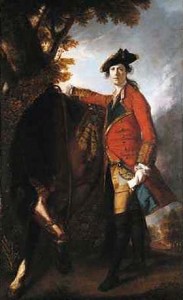
Braddock’s adc Captain Robert Orme painted in London by Sir Joshua Reynolds in the years after the Monongahela campaign. Orme found himself blamed for the failure and resigned from the army
Captain Orme recorded that at the end of May 1755 some Pennsylvania wagons came up from Conocacheague with very little flour due to the “infamous neglect of Cresap, the agent at the place.” Cresap’s father was employed to salt a quantity of beef by Governor Sharpe for the Maryland company. Cresap senior failed to use the necessary amount of salt and the beef was condemned on its arrival at Fort Cumberland.
In view of the shortfall in flour, on the same day and as a matter of urgency the Virginia Light Horse, commanded by Captain Stewart, was sent to Winchester with 30 wagons and 200 carrying horses to bring back as much flour as possible.
William Shirley, Braddock’s secretary and the son of Governor Shirley of Massachusetts, wrote to Governor Morris of Pennsylvania: “It is a joke to suppose that secondary Officers [Orme and others] can make amends for the defects of the First [Braddock]. The main spring must be the mover; others in many cases can do no more than follow and correct a little its motions. As to them, I don’t think we have much to boast. Some are insolent and ignorant; others capable, but rather aiming at showing their own abilities than making a proper use of them. I have a great love for my friend Orme, and think it is uncommonly fortunate for our Leader, that he is under the influence of so honest and capable a man, but I wish, for the sake of the Publick, he had some more experience of business, particularly in America. As to myself, I came out of England expecting that I might be taught the business of a military secretary, but I am already convinced of my mistake. I would willingly hope my time may not be quite lost to me. You will think me out of humour. I own I am so. I am greatly disgusted at seeing an Expedition (as it is called), so ill-concerted originally in England and so ill-appointed, so improperly conducted in America; and so much fatigue and expense incurred for a purpose which, if attended with success, might better have been left alone….. I am likewise further chagrined at seeing the prospect of affairs in America which, when we were at Alexandria I looked upon to be very great and promising, through delays and disappointments which might have been prevented, grown cloudy and in danger of ending in little or nothing.”
On Saturday 24th May 1755, at Alexandria, Charlotte Browne recorded: “5 wagons came we wait for 4 more. Mr Napper sent us 2 marquees. Very busy in getting ready to march.” The hospital was about to move up to Fort Cumberland at Will’s Creek from Alexandria.
On Sunday 25th May 1755, Captain Cholmley’s batman recorded: “began loading wagons with ammunition and provisions. Officer’s command went to Winchester after 9 at night. No prayers the minister being sick.”General Braddock’s orders directed: “any nco or soldier found gaming 300 lashes without court martial all standers by or lookers on shall be deemed principals and punished as such. 1 captain 1 lieutenant 1 ensign and 70 men of the 2 brigades to parade immediately at the fort. They are to take tents and 10 days provisions. The captain is to take orders from Quarter Master General [Sir John Saint Clair]. General Court Martial tomorrow: Sir Peter Halkett, Mr Shirley plus 2 field officers and 10 captains to sit at the president’s tent at 12.”
This party was to begin work on the road up the mountain to the west, the army’s route to Fort Duquesne on the Monongahela River.
The general court martial was to try Lieutenant Macleod of the Royal Artilleryand some deserters. Nowhere is Macleod’s offence revealed , although there is reference to his sentence being reduced and Macleod was at his duty in the battle on 9th July 1755. As Macleod is likely to have been a Highland Scot it may be that the court martial arose out of an incident in which Macleod’s loyalty was questioned and he reacted adversely. As one of the few artillery officers he will have been important to the army, or ought to have been.
On Tuesday 27th May 1755 Captain Cholmley’s batman recorded: “This day there were two men of Sir Peeter Halkett’s Regt that Rece’d a thousand lashes a piece for Stealing some Money and Diserting. They were drum’d through the lines with halters about their necks.”
The Seaman recorded: “We have now here 100 wagons which the commissionaires are loading with provisions. In the evening a captain’s guard marched for Winchester to escort the provisions to the camp. Some Indians came in here belonging to the Delawares.”
George Washingtonon, on his way back from Williamsburg after collecting the sum of money borrowed from Colonel Hunter’s partner, in a memorandum wrote: “I reached Winchester and expected to have met the troop of Light Horse to escort me to the camp but being disappointed in that I engaged a guard of the militia with which I set out on the 29th following and arrived at the camp the 30th.”
Washington was returning with the money borrowed in Williamsburg. In relation to his difficulties with the Winchester Militia, Washington made the comment, “You would as soon raise the dead, as the Fairfax county militia”.
The Involvement of Pennsylvania:
In answer to a request for assistance from General Braddock, Governor Morris of Pennsylvania agreed to provide a magazine of provisions for the army at Shippensburgh and to extend the road from Pennsylvania, so that it met the road to be built by Braddock’s army at the Turkey’s foot on the Youghiogheny River. In the event neither of these arrangements, although pressed ahead by the Pennsylvanians, had any effect on the conduct of the campaign in 1755. However the Pennsylvania road was the route used in the subsequent successful attack on Fort Duquesne by General Forbes in 1758.
General Braddock’s Council of War:
Captain Orme records that General Braddock held two Councils of War, a few days apart. Orme does not give the date for these Councils of War, but they seem to have been held around 27th May 1755.
The officers called to the Council of War were: Colonel Sir Peter Halkett, Colonel Robert Dunbar, Lieutenant Colonel Thomas Gage (44th), Lieutenant Colonel Ralph Burton (48th), Major Russell Chapman (44th), Major William Sparks (48th) and Colonel Sir John Saint Clair (Deputy Quartermaster General).
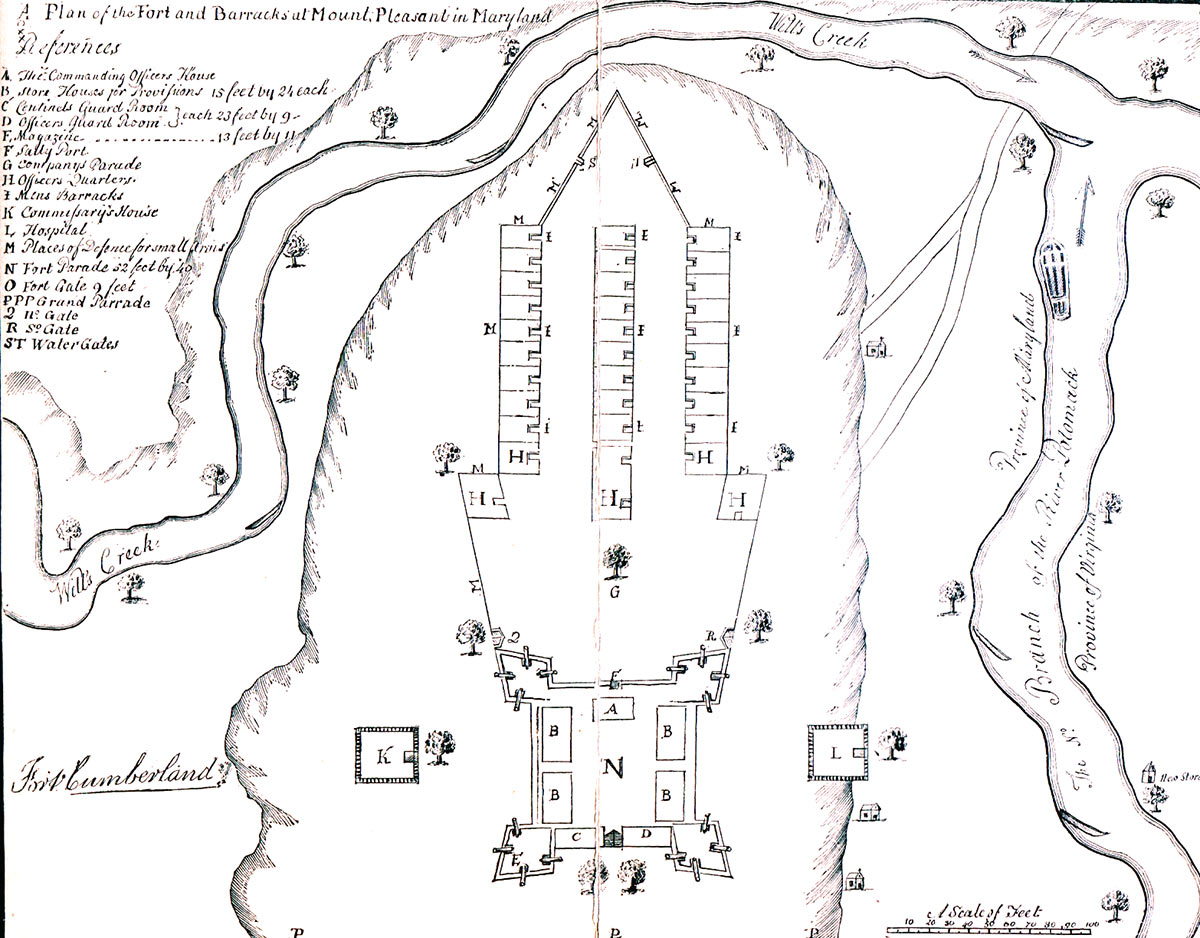
Plan of Fort Cumberland in 1755, held in the King’s Library of the British Museum (now in the British Library), from Lowdermilk’s book, Cumberland in Maryland
It is likely that the General’s three ADCs attended the Council in their capacity as members of his staff. Otherwise it is hard to see how Orme would have known what transpired.
The only record of the proceedings of the Councils of War is in Orme’s record of the campaign that he compiled afterwards. Orme was by this time well aware that he was going to bear the majority of the criticism for the disaster, in view of Braddock’s death.
At the first Council of War Braddock described the precautions he proposed to take on the march to protect what Orme described as the “Vast number of carriages and horses.” Braddock proposed to protect the column against Indian attack by dividing the troops into contingents posted down each side of the line of wagons, with small parties positioned out on the flanks and guards to the front and rear . At the end of each march day the army would encamp in its order of march, closing up to reduce the length of the line.
Various guards would be formed and given responsibility for different parts of the column. The Council endorsed the General’s plans for the march.
Soon after the first Council of War a party of Indians returned from reconnaissance of Fort Duquesne. They reported that the garrison was around 100 French soldiers, but that reinforcements were expected soon.
With this information General Braddock held the second Council of War. Braddock informed the Council of War that he considered the minimum supplies that must be taken on the march were 70 days flour and 50 days meat and that the 190 wagons and 600 carrying horses available to the army were insufficient to carry this level of supply.
Braddock stated that Captain Stewart’s party had not returned from Winchester with the flour he had been sent to collect and could not be expected for a further 7 days. Braddock proposed to use this time by sending Sir John Saint Clair with 600 men and 2 six pounder guns to begin making the road as far as the first crossing of the Yougougheny River, where they would establish a magazine and a defensive position. Half the force would then return with the wagons, which would be loaded again and brought up by the rest of the army.
The General proposed that the remainder of the army would march out in 3 Divisions on separate days. The first division would comprise the 44th Regiment, commanded by Sir Peter Halkett, with 100 wagons containing provisions, stores and powder. The second division would be commanded by Lieutenant Colonel Burton and comprise the Independent Companies and the Virginia, Carolina and Maryland Rangers and the artillery, carrying ammunition and some stores and provisions. The third division would comprise the 48th Regiment, commanded by Colonel Dunbar, with the wagons from Winchester, the wagons returned by the advance party and all the carrying horses. The Council of War approved these arrangements.
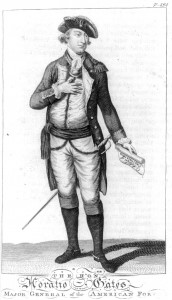
Horatio Gates, as a major general in the American Forces, during the American War of Independence. Gates commanded one of the independent companies from New York
General Braddock’s orders for 27th May 1755 directed: “the party of advanced piquets to load with running ball, the rest of the piquets to load with powder and have the ball in their pockets [the advantage of loading with ‘running ball’ was that if the musket was not discharged the ball could be recovered, whereas if loaded with a wad so that it was stuck fast the ball could not be recovered and had to be discharged and lost at the end of the day’s duty]. The following detachment to march on Thursday morning to parade at reveille. Men to be provided with 2 days provisions ready dress’d. 44th and 48th to furnish 1 field officer 4 capts, 12 subs 12 sgts and 250 rank and file. Rutherford’s, Demere’s, Wagoner’s, Peyrouney’s and Polson’s cos are also to march. Detachment to take camp equipage and baggage. Major Chapman field officer for the det. Particular care that arms in good order and each man has 10 flints and 24 rounds of ammunition. Tools and Tomahawks of the 2nd Brigade to be given at gun firing this evening to the QMG.”
This was the advance guard, commanded by Sir John Saint Clair, for the march to Fort Duquesne, leaving to begin the work of building the road. Either Orme’s recollection of the proposals put by Braddock to the Council of War for the advance party was faulty or the arrangements were changed so that Rutherford’s Independent New York Company and 2 companies of Virginia Rangers accompanied the force. Polson’s company were carpenters and therefore needed for the advance guard in order to carry out the work on the new road.
Captain Cholmley’s batman recorded on 28th May 1755: “orders that detachment of 600 men to march on Thursday. Captain Cholmley ordered for that command to take 1 day’s provisions and 2 pieces of canon and 2 coehorns.”
The Seaman recorded: “At 11 the Delawares met at the General’s tent and told him that they were come to know his intentions that they might assist the Army. The General thanked them and said he should march in a few days towards Fort Du Quesne. The Indians told him they would return home and collect their warriors together and meet him on the march. These people are villains and always side with the strongest. At noon it blowed and rained hard.”
In a letter to John Washington from Winchester George Washington stated: “The drought in this country if possible exceeds what we see below: so that it is very reasonably conjectured they won’t make corn to suffice the people and as for tobacco they decline all thoughts of making any.”
The reference to drought is significant. It would in part explain the difficulty in obtaining supplies for the army. Drought conditions would have interfered with the French communications between Canada and the Ohio Forks by reducing the river levels and making river travel more difficult.
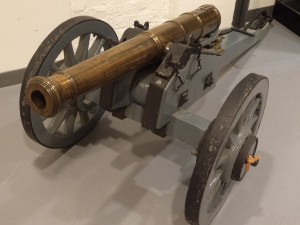
6 pounder field gun, the calibre of gun mainly used by General Braddock’s army in the march to the Monongahela in 1755
General Braddock’’s orders for 28th May 1755 stated: “Regulations of stoppages with the Director of the General Hospital to start on 24th. As it is necessary to employ the soldiers in making and amending the roads His Excellency has been pleased to appoint the following allowances:
Subalterns 3s per day Sergeants 1s per day Corporals 9d per day Drummers and private sentinels 6d per day. But as at present there is no public market His Excellency will pay when they arrive in winter quarters. Subalterns or sergeants to make returns of the men on working parties. Express going soon any letters for Great Britain to be given to Mr Shirley or an adc. Men that march tomorrow to be under the command of their own officers. 16 men from the line to be appointed to the guns that march tomorrow and under the direction of the officer of artillery.”
Braddock’s army was about to march from Fort Cumberland.
The previous section on Braddock’s defeat on the Monongahela in 1755 is Part 6: Braddock’s march to Will’s Creek, via Alexandria, Frederick and Winchester in Virginia and Maryland in 1755.
The next section on Braddock’s defeat on the Monongahela in 1755 is Part 8: Braddock’s army’s march from Fort Cumberland to Little Meadows May to June 1755.
To the French and Indian War index
